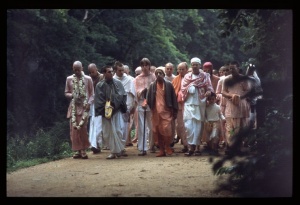CC Antya 13.112

A.C. Bhaktivedanta Swami Prabhupada
TEXT 112
- aṣṭa-māsa rahi' prabhu bhaṭṭe vidāya dilā
- 'vivāha nā kariha' bali' niṣedha karilā
SYNONYMS
aṣṭa-māsa — for eight months; rahi — staying; prabhu — Śrī Caitanya Mahāprabhu; bhaṭṭe — to Raghunātha Bhaṭṭa; vidāya dilā — bid farewell; vivāha nā kariha — do not marry; bali — saying; niṣedha karilā — he forbade.
TRANSLATION
After eight months, when Śrī Caitanya Mahāprabhu bade farewell to Raghunātha Bhaṭṭa, the Lord flatly forbade him to marry. "Do not marry," the Lord said.
PURPORT
Raghunātha Bhaṭṭācārya had become a greatly advanced devotee while still unmarried. Śrī Caitanya Mahāprabhu could see this, and therefore He advised him not to begin the process of material sense gratification. Marriage is a concession for people who are unable to control their senses. Raghunātha, however, being an advanced devotee of Kṛṣṇa, naturally had no desire for sense gratification. Therefore Śrī Caitanya Mahāprabhu advised him not to enter the bondage of marriage. Generally a person cannot make much advancement in spiritual consciousness if he is married. He becomes attached to his family and is prone to sense gratification. Thus his spiritual advancement is very slow or almost nil.